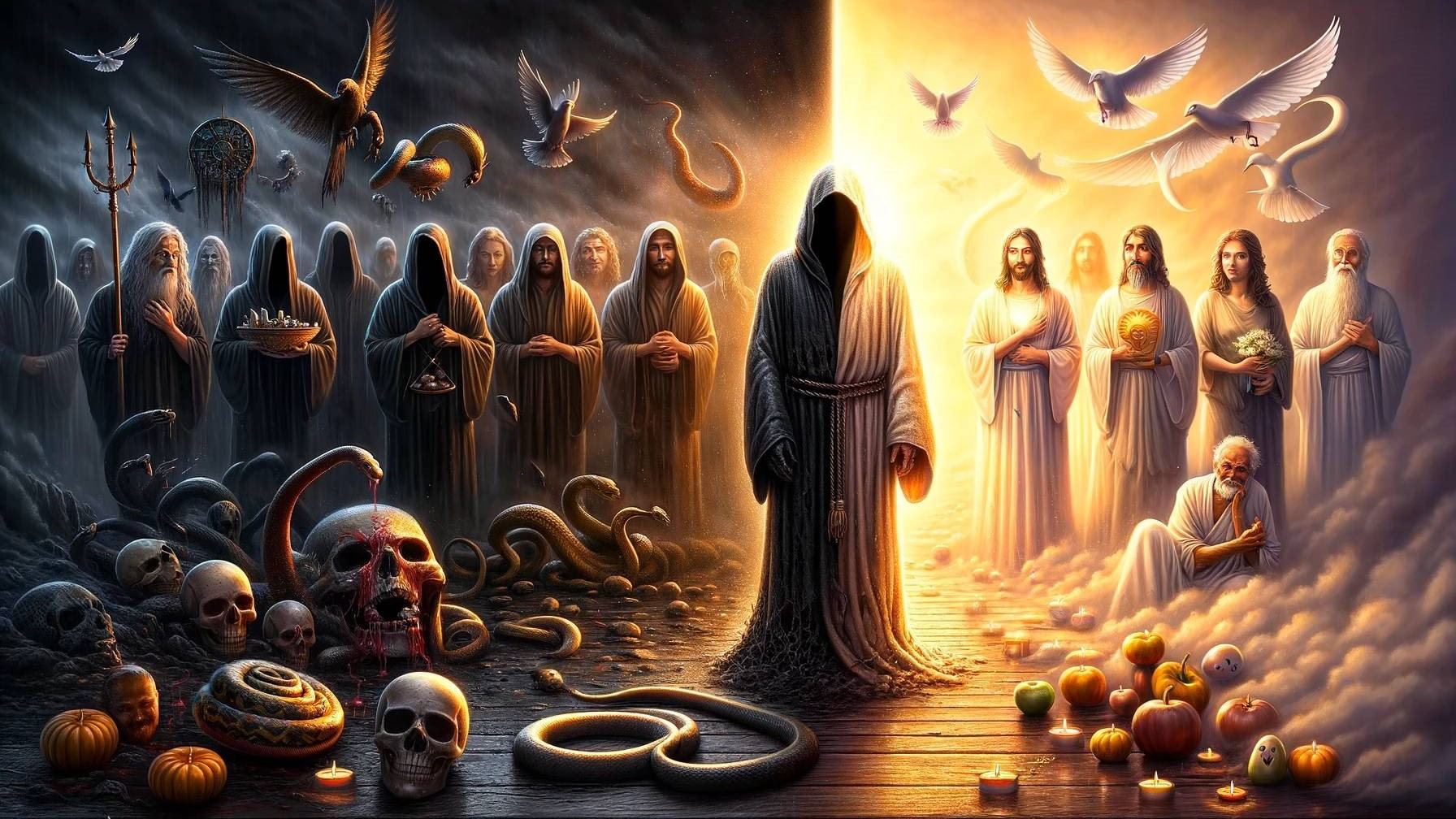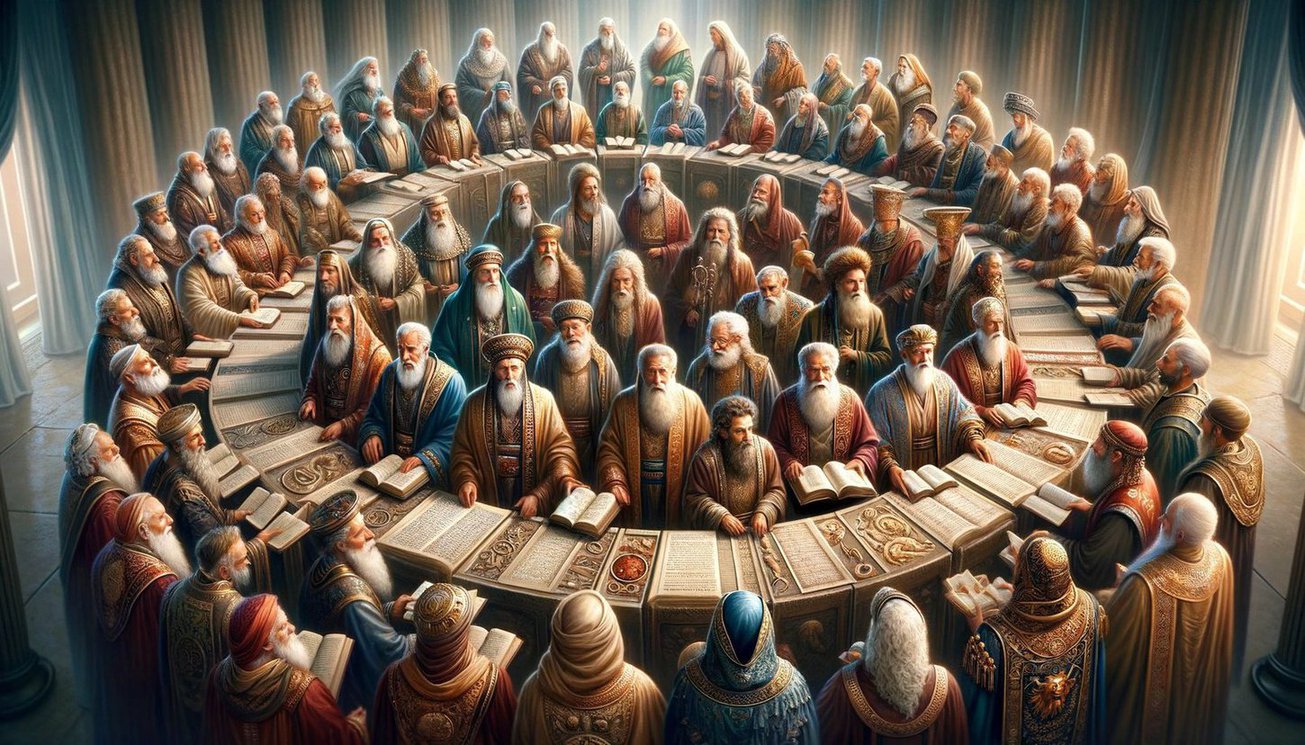Home>Bible Facts>Who Is The Audience For The Book Of Revelation


Bible Facts
Who Is The Audience For The Book Of Revelation
Published: February 11, 2024
Peter Smith, Editorial Director at Christian.net, combines deep insights into faith, politics, and culture to lead content creation that resonates widely. Awarded for his contributions to religious discourse, he previously headed a major organization for religious communicators, enhancing dialogue on faith's societal impacts.
Discover the audience for the Book of Revelation and explore fascinating Bible facts. Uncover the significance of this biblical text for believers and scholars alike.
(Many of the links in this article redirect to a specific reviewed product. Your purchase of these products through affiliate links helps to generate commission for Christian.net, at no extra cost. Learn more)
Table of Contents
Introduction
The Book of Revelation, the final book of the New Testament, is a captivating and enigmatic piece of literature that has intrigued and perplexed readers for centuries. Its vivid imagery, symbolic language, and prophetic messages have sparked intense debate and diverse interpretations among theologians, scholars, and general readers alike. As we delve into the multifaceted nature of the Book of Revelation, it becomes evident that its audience extends beyond the boundaries of time and space, encompassing both ancient and modern audiences with varying perspectives and purposes.
The allure of the Book of Revelation lies in its portrayal of apocalyptic visions, cosmic battles, and the ultimate triumph of good over evil. Its author, traditionally believed to be the apostle John, penned this visionary work during a period of intense persecution of early Christians under the Roman Empire. The historical context of oppression and suffering permeates the text, infusing it with a sense of urgency and hope for deliverance. This backdrop sets the stage for the profound impact of the Book of Revelation on its diverse audiences throughout history.
As we embark on a journey to explore the audience for the Book of Revelation, we will unravel the layers of its significance for theological and religious communities, academic and scholarly circles, as well as general readers and curious minds seeking to decipher its mysteries. Each audience brings a unique perspective and set of questions to the table, contributing to the rich tapestry of interpretations and engagements with this ancient text. Join us as we navigate the intricate terrain of the Book of Revelation and discover the diverse audiences that continue to be captivated by its timeless message.
Read more: Who Was The Book Of Revelation Written For?
Historical Context of the Book of Revelation
The historical context of the Book of Revelation is crucial to understanding its profound impact on ancient audiences and its enduring relevance today. Authored by the apostle John, the book was written during a tumultuous period of early Christianity, marked by intense persecution and political upheaval. John composed this visionary work while exiled on the island of Patmos, a consequence of his unwavering commitment to the Christian faith amidst the oppressive reign of the Roman Empire.
The Roman Empire, under the rule of Emperor Domitian, imposed severe persecution on Christians, compelling them to renounce their faith or face dire consequences. This hostile environment of persecution and suffering forms the backdrop against which the Book of Revelation unfolds. The imagery of cosmic battles, apocalyptic prophecies, and the triumph of good over evil resonated deeply with the persecuted Christian communities, offering them hope and reassurance in the face of adversity.
The symbolic language and vivid imagery employed in the Book of Revelation served as a form of coded communication, allowing the persecuted Christians to express their faith and resilience in the face of oppression. The use of symbolic numbers, such as seven and twelve, and the portrayal of heavenly visions and divine intervention, provided a powerful narrative that transcended the immediate challenges faced by the early Christian communities.
Furthermore, the historical context of the book reflects the broader socio-political landscape of the ancient world, characterized by imperial power, religious syncretism, and the clash of competing worldviews. The Roman imperial cult, which demanded allegiance and worship of the emperor as a deity, posed a direct challenge to the monotheistic beliefs of early Christians. In this context, the Book of Revelation emerges as a defiant proclamation of the sovereignty of God and the ultimate triumph of righteousness over the forces of oppression and tyranny.
By delving into the historical context of the Book of Revelation, we gain insight into the profound significance of its message for the persecuted early Christian communities and its enduring relevance as a testament to faith, resilience, and hope in the face of adversity. The historical backdrop of persecution, political turmoil, and religious conflict provides a compelling lens through which to appreciate the timeless impact of the Book of Revelation on its original audience and its continued resonance in contemporary society.
Interpretations of the Book of Revelation
The Book of Revelation has sparked a myriad of interpretations throughout history, reflecting the diverse theological, cultural, and philosophical perspectives of its readers. From ancient Christian communities to modern scholars, the enigmatic symbolism and prophetic imagery of Revelation have invited a spectrum of interpretations, each seeking to unravel its mysteries and discern its relevance for contemporary understanding.
-
Apocalyptic and Eschatological Interpretations: Many readers approach the Book of Revelation through the lens of apocalyptic literature, viewing its vivid imagery and prophetic visions as symbolic representations of the cosmic battle between good and evil, the ultimate triumph of God's kingdom, and the eschatological fulfillment of divine purposes. This perspective emphasizes the unfolding of end-time events and the anticipation of a new heaven and a new earth, resonating with the hope for divine justice and restoration.
-
Historical Interpretations: Some scholars and historians interpret the symbols and events in Revelation within the context of the author's contemporary world, identifying them with specific historical figures, events, and movements. This approach seeks to uncover the socio-political dynamics of the ancient Roman Empire and the early Christian communities, shedding light on the book's relevance to the historical struggles and triumphs of its original audience.
-
Symbolic and Allegorical Interpretations: The symbolic nature of the book's imagery has led to allegorical interpretations, where its visions are seen as representing timeless spiritual truths and moral principles. This approach emphasizes the universal significance of Revelation's message, transcending specific historical contexts to address the enduring human quest for meaning, faith, and redemption.
-
Futurist and Dispensationalist Interpretations: Within certain Christian traditions, the Book of Revelation is interpreted through a futurist lens, anticipating the literal fulfillment of its prophecies in a future period of tribulation and the second coming of Christ. This perspective often intersects with dispensationalist theology, which delineates distinct periods of divine intervention and judgment in human history.
-
Literary and Symbolic Interpretations: Literary scholars and theologians explore the rich symbolism and narrative structure of Revelation, appreciating its artistic and rhetorical dimensions. This approach highlights the intricate use of imagery, metaphor, and dramatic storytelling, inviting readers to engage with the text as a profound work of literary artistry and theological reflection.
The diverse interpretations of the Book of Revelation reflect the enduring fascination and complexity of this ancient text, inviting readers to grapple with its enigmatic visions and profound theological themes. Whether approached as a source of eschatological hope, a historical testament, a symbolic allegory, or a literary masterpiece, the Book of Revelation continues to captivate and inspire diverse audiences, transcending temporal and cultural boundaries with its timeless message of divine sovereignty and ultimate redemption.
Theological and Religious Audiences
The Book of Revelation holds a profound significance for theological and religious audiences, encompassing a wide spectrum of Christian traditions, denominations, and theological perspectives. Within the realm of Christian theology, the Book of Revelation serves as a focal point for eschatological inquiry, spiritual reflection, and ethical discernment, shaping the beliefs, practices, and communal identity of diverse religious communities.
For many theological audiences, the Book of Revelation represents a source of eschatological hope and anticipation, offering a vision of divine sovereignty, cosmic redemption, and the ultimate triumph of God's kingdom. Within this framework, the apocalyptic imagery and prophetic symbolism of Revelation are interpreted as signposts of the unfolding drama of human history, pointing towards the consummation of God's purposes and the fulfillment of divine promises. This eschatological perspective infuses theological discourse with a sense of expectancy and vigilance, calling believers to live in readiness for the culmination of God's redemptive plan.
Moreover, the Book of Revelation holds a central place in the liturgical and devotional life of many religious communities, shaping their worship practices, spiritual formation, and ethical engagement. The rich imagery and evocative language of Revelation are often incorporated into liturgical readings, hymns, and artistic expressions, serving to evoke a sense of awe, reverence, and contemplation of the divine mysteries. The themes of perseverance in the face of persecution, the victory of the Lamb, and the establishment of the new Jerusalem resonate deeply with the spiritual journey and ethical commitments of religious audiences, inspiring them to embody faithfulness, resilience, and hope in their lived experience.
Furthermore, the theological and ethical dimensions of the Book of Revelation invite religious audiences to grapple with profound questions of justice, suffering, and theodicy in the face of adversity. The portrayal of cosmic conflict, divine judgment, and the vindication of the faithful prompts theological reflection on the nature of evil, the complexities of human agency, and the ultimate triumph of God's righteousness. This theological engagement with Revelation fosters a robust dialogue on the ethical imperatives of social justice, compassion, and solidarity, calling religious communities to embody the values of the heavenly kingdom amidst the challenges of the present age.
In essence, the Book of Revelation continues to captivate and inspire theological and religious audiences, serving as a wellspring of eschatological hope, spiritual nourishment, and ethical discernment within the tapestry of Christian faith and practice. Its enduring relevance and theological depth resonate with the diverse expressions of Christian belief and devotion, inviting theological audiences to embrace its transformative vision of divine sovereignty, redemption, and the ultimate fulfillment of God's purposes in the world.
Academic and Scholarly Audiences
Academic and scholarly audiences engage with the Book of Revelation through rigorous research, critical analysis, and interdisciplinary inquiry, seeking to unravel its complex textual, historical, and theological dimensions. The scholarly exploration of Revelation spans a diverse array of disciplines, including biblical studies, theology, history, literature, archaeology, and cultural studies, reflecting the multifaceted nature of its impact on academic discourse and intellectual inquiry.
Within the field of biblical studies, scholars delve into the linguistic, literary, and historical aspects of the Book of Revelation, employing textual criticism, source analysis, and comparative study of ancient apocalyptic literature to discern its authorship, compositional history, and socio-cultural milieu. The intricate use of symbolism, the theological motifs, and the reception history of Revelation are subject to meticulous examination, shedding light on its diverse interpretations and influences across different historical periods and cultural contexts.
Moreover, the theological dimensions of Revelation are a focal point for scholarly investigation, prompting in-depth exploration of its eschatological themes, Christological imagery, and ethical imperatives. The theological diversity within academic circles engenders vibrant debates on the nature of divine sovereignty, theodicy, and the interpretation of apocalyptic symbolism, enriching the scholarly discourse with a plurality of perspectives and interpretive frameworks.
In addition to biblical and theological inquiry, academic audiences approach the Book of Revelation from literary and historical perspectives, appreciating its artistic, rhetorical, and socio-political dimensions. Literary scholars analyze the narrative structure, imagery, and intertextual echoes within Revelation, situating it within the broader tradition of apocalyptic and prophetic literature. Historical investigations contextualize the book within the socio-political dynamics of the ancient world, exploring its resonances with imperial ideology, religious syncretism, and the experiences of early Christian communities under Roman persecution.
Furthermore, the interdisciplinary nature of academic engagement with Revelation fosters fruitful dialogue across diverse fields of study, enriching the scholarly landscape with nuanced insights and cross-disciplinary perspectives. The enduring fascination with the Book of Revelation among academic and scholarly audiences testifies to its enduring relevance as a rich tapestry of theological, literary, and historical significance, inviting ongoing exploration and interpretation within the vibrant realm of intellectual inquiry.
The scholarly exploration of the Book of Revelation encompasses a rich tapestry of disciplines, reflecting its enduring relevance and multifaceted impact on academic discourse and intellectual inquiry. From biblical studies and theology to history, literature, and cultural studies, the scholarly engagement with Revelation continues to inspire rigorous research, critical analysis, and interdisciplinary dialogue, enriching the academic landscape with diverse perspectives and interpretive frameworks.
General Readers and Curious Minds
The Book of Revelation, with its enigmatic symbolism and prophetic imagery, captivates the imagination of general readers and curious minds, inviting them into a world of cosmic battles, divine mysteries, and apocalyptic visions. For many individuals outside the realms of theological or academic discourse, the allure of Revelation lies in its profound narrative power, its timeless themes of good versus evil, and its enduring relevance to the human quest for meaning and transcendence.
General readers, ranging from avid book enthusiasts to casual seekers of spiritual insight, are drawn to the Book of Revelation for its evocative portrayal of cosmic drama and divine intervention. The vivid imagery of heavenly visions, celestial beings, and eschatological prophecies sparks a sense of wonder and curiosity, prompting readers to delve into its pages in search of spiritual enlightenment and intellectual stimulation.
Moreover, the symbolic language and allegorical depth of Revelation resonate with the universal human longing for transcendence and existential reflection. The book's portrayal of the struggle between light and darkness, the triumph of righteousness, and the promise of a new creation speaks to the profound questions and aspirations that resonate within the human heart, transcending cultural, religious, and philosophical boundaries.
For curious minds seeking to unravel the mysteries of Revelation, the book serves as a gateway to exploring the rich tapestry of apocalyptic literature, biblical symbolism, and theological imagination. Its enigmatic nature invites readers to embark on a journey of discovery, prompting them to engage with its profound themes of hope, perseverance, and the ultimate victory of divine justice.
Furthermore, the enduring fascination with the Book of Revelation among general readers testifies to its timeless appeal as a work of literary artistry and spiritual contemplation. Its influence extends beyond religious or scholarly circles, resonating with individuals who are drawn to its enigmatic allure and timeless message of hope amidst adversity.
In essence, the Book of Revelation continues to captivate and inspire general readers and curious minds, inviting them to embark on a transformative journey of exploration, contemplation, and spiritual discovery. Its enduring relevance and universal themes speak to the timeless aspirations and existential quests that unite humanity in a shared pursuit of meaning, transcendence, and the enduring hope for a world renewed.
Conclusion
The Book of Revelation, with its enigmatic symbolism and prophetic imagery, continues to captivate and inspire diverse audiences across the spectrum of theological, scholarly, and general readership. Its enduring relevance and timeless message of hope, resilience, and divine sovereignty transcend temporal and cultural boundaries, inviting ongoing exploration and interpretation within the vibrant tapestry of human inquiry and spiritual reflection.
As we navigate the intricate terrain of the Book of Revelation, we encounter a rich mosaic of interpretations, each contributing to the multifaceted significance of this ancient text. From theological and religious audiences who find in Revelation a wellspring of eschatological hope, spiritual nourishment, and ethical discernment, to scholarly circles engaging in rigorous research, critical analysis, and interdisciplinary dialogue, the enduring fascination with Revelation testifies to its enduring impact on human thought and imagination.
The historical context of persecution and suffering, against the backdrop of the Roman Empire, infuses the Book of Revelation with a sense of urgency and hope for deliverance, resonating deeply with the persecuted early Christian communities and offering a timeless message of resilience and faith in the face of adversity. Its symbolic language and vivid imagery served as a form of coded communication, allowing the persecuted Christians to express their faith and resilience in the face of oppression, while also transcending specific historical contexts to address the enduring human quest for meaning, faith, and redemption.
The diverse interpretations of the Book of Revelation, ranging from apocalyptic and eschatological perspectives to historical, symbolic, and literary approaches, reflect the enduring fascination and complexity of this ancient text, inviting readers to grapple with its enigmatic visions and profound theological themes. Whether approached as a source of eschatological hope, a historical testament, a symbolic allegory, or a literary masterpiece, the Book of Revelation continues to captivate and inspire diverse audiences, transcending temporal and cultural boundaries with its timeless message of divine sovereignty and ultimate redemption.
In essence, the Book of Revelation stands as a testament to the enduring power of human imagination, spiritual aspiration, and intellectual inquiry, inviting readers of all backgrounds to embark on a transformative journey of exploration, contemplation, and spiritual discovery. Its timeless appeal as a work of literary artistry and spiritual contemplation speaks to the universal human longing for transcendence and existential reflection, uniting humanity in a shared pursuit of meaning, transcendence, and the enduring hope for a world renewed.














